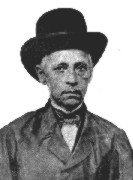Manoel Arruda da Cámara
| Manuel Arruda da Câmara | |
|---|---|
 |
|
| Born | 1752 Pombal, Paraiba |
| Died | October 2, 1810 (aged 57–58) Goiana, Pernambuco |
| Nationality | Brazilian |
| Scientific career | |
| Fields | Botany |
Padre Manuel Arruda da Câmara (Pombal 1752–Goiana, October 2, 1810) was a Portuguese cleric, physician and scientist, who became known as one of the great Brazilian botanists of the late eighteenth century.
(added by HJ Arruda Pacheco July 28, 2017) I am a little confused. How can there exist a picture of my ancestor as photography was invented after Manuel Arruda da Camara's death. First known photo was around 1825.
His parents, Francisco Arruda da Câmara and Maria Saraiva da Silva, were New Christians, (Cristão-novo) Jews who were forced to convert to Christianity in the Spanish and Portuguese lands by the Inquisition. Born in the hinterland of Paraiba State, his father was a farmer. He was initially educated in Goiana, Pernambuco and on November 23, 1783 he took orders at the Carmelitas Calçados monastery of Calçados in Goiana, Pernambuco State, adopting the name Frei Manuel do Coração de Jesus. Following this, he and his brother Francisco travelled to Europe to further their studies. He attended the University of Coimbra in 1786, where he graduated in Natural Philosophy, and then after moving to Montpellier, France, in 1790 he received his doctorate in medicine from the University of Montpellier.
While in France he had come in contact with the ideas of Voltaire and Rousseau, and the spirit of the French Revolution. Back in Brazil he became keenly aware of social injustice in his own society. He was also a Freemason and founded the Areopagus Lodge (Areópago de Itambé), a liberal philosophical society which attracted a number of local intellectuals and was involved in the Conspiracy of Suaçunas in 1801. This was one of the early attempts to liberate Brazil from Portuguese colonial rule in Brazil (Movimentos Emancipacionistas). The lodge was closed down by the authorities in 1802, and da Câmara would not see independence achieved in his lifetime. In 1805 he relinquished his vows.
...
Wikipedia
